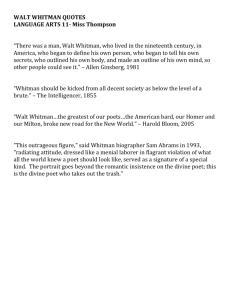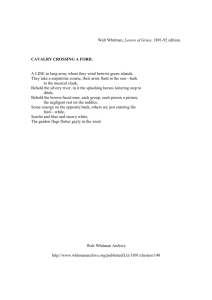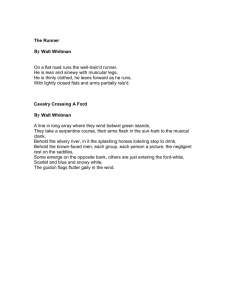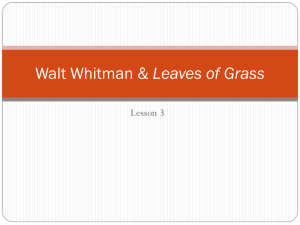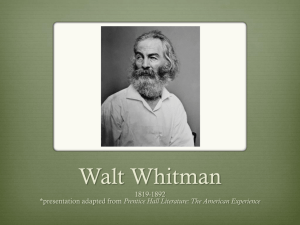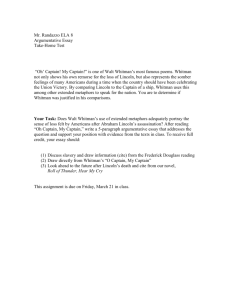Walt Whitman - WordPress.com
advertisement
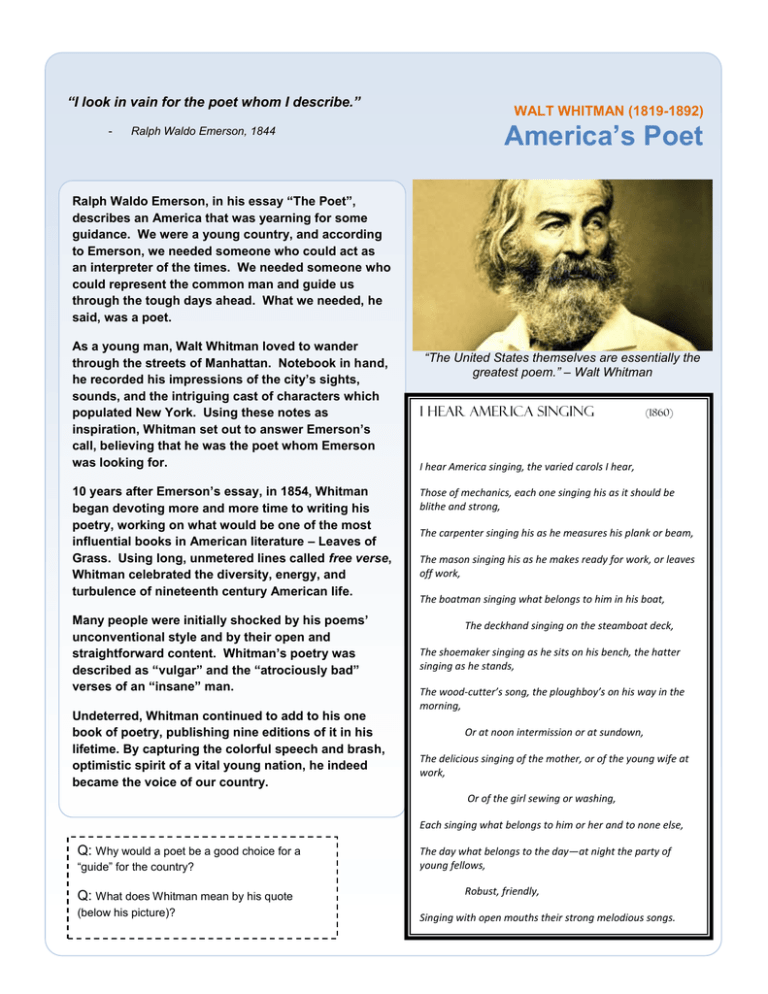
“I look in vain for the poet whom I describe.” - Ralph Waldo Emerson, 1844 WALT WHITMAN (1819-1892) America’s Poet Ralph Waldo Emerson, in his essay “The Poet”, describes an America that was yearning for some guidance. We were a young country, and according to Emerson, we needed someone who could act as an interpreter of the times. We needed someone who could represent the common man and guide us through the tough days ahead. What we needed, he said, was a poet. As a young man, Walt Whitman loved to wander through the streets of Manhattan. Notebook in hand, he recorded his impressions of the city’s sights, sounds, and the intriguing cast of characters which populated New York. Using these notes as inspiration, Whitman set out to answer Emerson’s call, believing that he was the poet whom Emerson was looking for. 10 years after Emerson’s essay, in 1854, Whitman began devoting more and more time to writing his poetry, working on what would be one of the most influential books in American literature – Leaves of Grass. Using long, unmetered lines called free verse, Whitman celebrated the diversity, energy, and turbulence of nineteenth century American life. Many people were initially shocked by his poems’ unconventional style and by their open and straightforward content. Whitman’s poetry was described as “vulgar” and the “atrociously bad” verses of an “insane” man. Undeterred, Whitman continued to add to his one book of poetry, publishing nine editions of it in his lifetime. By capturing the colorful speech and brash, optimistic spirit of a vital young nation, he indeed became the voice of our country. “The United States themselves are essentially the greatest poem.” – Walt Whitman I Hear America Singing (1860) I hear America singing, the varied carols I hear, Those of mechanics, each one singing his as it should be blithe and strong, The carpenter singing his as he measures his plank or beam, The mason singing his as he makes ready for work, or leaves off work, The boatman singing what belongs to him in his boat, The deckhand singing on the steamboat deck, The shoemaker singing as he sits on his bench, the hatter singing as he stands, The wood-cutter’s song, the ploughboy’s on his way in the morning, Or at noon intermission or at sundown, The delicious singing of the mother, or of the young wife at work, Or of the girl sewing or washing, Each singing what belongs to him or her and to none else, Q: Why would a poet be a good choice for a “guide” for the country? Q: What does Whitman mean by his quote (below his picture)? The day what belongs to the day—at night the party of young fellows, Robust, friendly, Singing with open mouths their strong melodious songs. “Do I contradict myself? Very well then…I contradict myself; I am large…I contain multitudes.” From Song of Myself 1855 1 I celebrate myself, and sing myself, And what I assume you shall assume, For every atom belonging to me as good belongs to you. I loafe and invite my soul, I lean and loafe at my ease observing a spear of summer grass. My tongue, every atom of my blood, form’d from this soil, this air, Born here of parents born here from parents the same, and their parents the same, I, now thirty-seven years old in perfect health begin, Hoping to cease not till death. Creeds and schools in abeyance, Retiring back a while sufficed at what they are, but never forgotten, I harbor for good or bad, I permit to speak at every hazard, Nature without check with original energy. “I celebrate myself, and sing myself” 6 A child said What is the grass? Fetching it to me with full hands; How could I answer the child? I do not know what it is any more than he. I guess it must be the flag of my disposition, out of hopeful green stuff woven. Or I guess it is the handkerchief of the Lord, A scented gift and remembrancer designedly dropt, Bearing the owner’s name someway in the corners, that we may see and remark, And say Whose? What do you think has become of the young and old men? And what do you think has become of the women and children? They are alive and well somewhere, The smallest sprout shows there is really no death, And if ever there was it led forward life, and does not wait at the end to arrest it, And ceas’d the moment life appear’d. All goes onward and outward, nothing collapses, And to die is different from what any one supposed, and luckier 52 The spotted hawk swoops by and accuses me, he complains of my gab and my loitering. I too am not a bit tamed, I too am untranslatable, I sound my barbaric yawp over the roofs of the world. The last scud of day holds back for me, It flings my likeness after the rest and true as any on the shadow’d wilds, It coaxes me to the vapor and the dusk. I depart as air, I shake my white locks at the runaway sun, I effuse my flesh in eddies, and drift it in lacy jags. I bequeath myself to the dirt to grow from the grass I love, If you want me again look for me under your boot-soles. You will hardly know who I am or what I mean, But I shall be good health to you nevertheless, And filter and fibre your blood. Failing to fetch me at first keep encouraged, Missing me one place search another, I stop somewhere waiting for you. “I too am not a bit tamed, I too am untranslatable.” Spirit of the Pioneer – the Essence of Walt Whitman From Song of the Open Road 1856 Afoot and light-hearted I take to the open road, Healthy, free, the world before me, The long brown path before me leading wherever I choose. Henceforth I ask not good-fortune, I myself am good-fortune, Henceforth I whimper no more, postpone no more, need nothing, Done with indoor complaints, libraries, querulous criticisms, Strong and content I travel the open road. Walt Whitman, 1855 Engraving When I Heard the Learn’d Astronomer 1865 A Noiseless Patient Spider 1876 A noiseless patient spider, When I heard the learn’d astronomer; When the proofs, the figures, were ranged in columns I mark’d where on a little promontory it stood isolated, Mark’d how to explore the vacant vast surrounding, Before me, When I was shown the charts and the diagrams, to add, divide, And measure them, When I, sitting, heard the astronomer, where he lectured With much applause in the lecture-room, How soon, unaccountable, I became tired and sick, Till rising and gliding out, I wander’d off by myself, In the mystical moist night-air, and from time to time, Look’d up in perfect silence at the stars. America It launch’d forth filament, filament, filament, out of itself, Ever unreeling them, ever tirelessly speeding them. And you O my soul where you stand, Surrounded, detached, in measureless oceans of space, Ceaselessly musing, venturing, throwing, seeking the spheres to Connect them, 1888 Centre of equal daughters, equal sons, Till the bridge you will need be form’d, till the ductile anchor hold, Till the gossamer thread you fling catch somewhere, O my soul. All, all alike endear’d, grown, ungrown, young or old, Strong, ample, fair, enduring, capable, rich, Perennial with the Earth, with Freedom, Law and Love, A grand, sane, towering, seated Mother, Chair’d in the adamant of Time. “To have great poets, there must be great audiences.” - Walt Whitman Beat! Beat! Drums! 1861 Beat! Beat! Drums! – blow! Bugles! Blow! Through the windows—through doors—burst like a ruthless force, Into the solemn church, and scatter the congregation, Into the school where the scholar is studying; Leave not the bridegroom quiet—no happiness must he have now With his bride, Nor the peaceful farmer any peace, ploughing his field or gathering His grain, So fierce you whirr and pound you drums—so shrill you bugles Blow. Beat! Beat! Drums!—blow! Bugles! Blow! Over the traffic of cities—over the rumble of wheels in the streets; O me! O Life! 1892 O Me! O Life! Of the questions of these recurring; Of the endless trains of the faithless – of cities fill’d with the foolish; Of myself forever reproaching myself, (for who more foolish than I, and who more faithless?) Of eyes that vainly crave the light – of the objects mean – of the struggle ever renew’d; Of the poor results of all – of the plodding and sordid crowds I see around me; Of the empty and useless years of rest – with the rest me intertwined; Are beds prepared for sleepers at night in the houses? No sleepers Must sleep in those beds, No bargainers’ bargains by day—no brokers or speculators—would they continue? Would the talkers be talking? Would the singer attempt to sing? Would the lawyer rise in the court to state his case before the judge? Then rattle quicker, heavier drums—you bugles wilder blow. The question, o me! So sad, recurring – what good amid these, o me, o life? Answer: That you are here – that life exists, and identity; That the powerful play goes on, and you will contribute a verse. Beat! Beat! Drums!—blow! Bugles! Blow! Make no parley—stop for no expostulation, Mind not the timid—mind not the weeper or prayer, Mind not the old man beseeching the young man, Let not the child’s voice be heard, nor the mother’s entreaties, Make even the trestles to shake the dead where they lie awaiting the hearses, So strong you thump O terrible drums—so loud you bugles blow. The proof of a poet is that his country absorbs him as affectionately as he has absorbed it." - Walt Whitman, from the 1st edition of Leaves of Grass, 1854 Walt Whitman, in one of his last photos, 1887 “Death does its work, obliterates a hundred, a thousand – President, general, captain, private – but the Nation is immortal.” - O Captain! My Captain! Walt Whitman, on the death of Abraham Lincoln, April, 1865 1865 O Captain! My Captain! our fearful trip is done, From When Lilacs Last in the Dooryard Bloom’d 1865 2 The ship has weather’d every rack, the prize we sought is won, The port is near, the bells I hear, the people all exulting, While follow eyes the steady keel, the vessel grim and daring; But O heart! heart! heart! O the bleeding drops of red, Where on the deck my Captain lies, Fallen cold and dead. O powerful western fallen star! O shades of night – O moody, tearful night! O great star disappear’d – O the black murk that hides the star! O cruel hands that hold me powerless – O helpless soul of me! O harsh surrounding cloud that will not free my soul. 6 O Captain! my Captain! rise up and hear the bells; Coffin that passes through lanes and streets, Rise up – for you the flag is flung – for you the bugle trills, Through day and night with the great cloud darkening the land, For you bouquets and ribbon’d wreaths – for you the shores acrowding, With pomp of the inloop’d flags with the cities draped in black, For you they call, the swaying mass, their eager faces turning; With the show of the States themselves as of crape-veil’d women standing, Here Captain! dear father! This arm beneath your head! It is some dream that on the deck, With processions long and winding and the flambeaus of the night, With the countless torches lit, with the silent sea of faces and the unbared heads, You’ve fallen cold and dead. With the waiting depot, the arriving coffin, and the somber faces, My Captain does not answer, his lips are pale and still, With dirges through the night, with the thousand voices rising strong and solemn, My father does not feel my arm, he has no pulse nor will, The ship is anchor’d safe and sound, its voyage closed and done, From fearful trip the victor ship comes in with object won; With all the mournful voices of the dirges pour’d around the coffin, The dim-lit churches and the shuddering organs – where amid these you journey, Exult O shores, and ring O bells! With the tolling tolling bells’ perpetual clang, But I with mournful tread, Here, coffin that slowly passes, Walk the deck my Captain lies, I give you my sprig of lilac. Fallen cold and dead. Whitman and Lincoln: The War Years A Sight in Camp in the Daybreak Gray and Dim 1864 A sight in camp in the daybreak gray and dim, As from my tent I emerge so early sleepless, As slow I walk in the cool fresh air the path near by the hospital tent, Three forms I see on stretchers lying, brought out there untended lying, Over each the blanket spread, ample brownish woolen blanket, Gray and heavy blanket, folding, covering all. Curious I halt and silent stand, Then with light fingers I from the face of the nearest the first just lift the blanket; Who are you elderly man so gaunt and grim, with well-gray’d hair, and flesh all sunken about the eyes? Who are you my dear comrade? Then to the second I step – and who are you my child and darling? Who are you sweet boy with cheeks yet blooming? Then to the third – a face nor child nor old, very calm, as of beautiful yellow – white ivory; Young man I think I know you – I think this face is the face of the Christ himself, Dead and divine and brother of all, and here again he lies. “O heavens, what scene is this? – is this indeed humanity?” - Walt Whitman, upon seeing the wounded arrive in the hospitals, May 12, 1863 As America moved into the Civil War, Walt Whitman entered a phase of sadness and concern. His great country, for which he had such great hope, was now coming apart at the seams. The very ideals he had believed in were falling away as the country went through a great change. This change in his country would be reflected in a change in the tone of his poetry. When it was reported that Whitman’s younger brother was killed in battle in 1862, he made his way to Washington, D.C., to recover his brother’s body. Although he would find out, happily, that his brother was only slightly wounded, Whitman was appalled at what he saw in the military hospitals there. Scores of young men were dying each day, many without limbs, and many without anyone to ease their suffering. It was then that Walt Whitman decided to stay in D.C. to help care for the many wounded soldiers. While in Washington, Walt Whitman often crossed paths with President Abraham Lincoln, and he became convinced that Lincoln was the only person who could end this war and bring the country back together. Just days after the war’s end, in April, 1865, Lincoln would be assassinated while attending a play. The country was devastated – as was Walt Whitman. “O Captain! My Captain!”, and “When Lilacs Last in the Dooryard Bloom’d” were two poems written to commemorate the late president.
